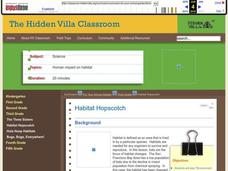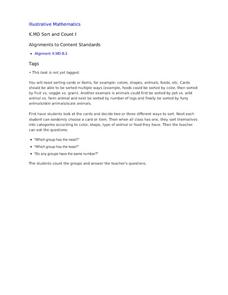Curated OER
Tallying Animal Characteristics
Take a trip to the farm! While examining an image of farmyard animals, learners make two separate tallies: animals with two legs and animals with four legs. Then, they add up the numbers to find the total number of animals. They could...
Agriculture in the Classroom
"Steer" Toward STEM: Careers in Animal Agriculture
Think like an engineer and an agricultural scientist over the course of 12 lessons in a STEM based unit. Young scientists take on the roles of animal physiologists, animal geneticists, agricultural engineers, animal nutritionists,...
Curated OER
Hattie and the Fox
Who is Hattie? Youngsters explore animal characteristics by reading poems and stories in class. They read the book Hattie and the Fox about a fictitious fox and his drama with the other farm animals. Then they reread the story over...
Curated OER
Farm Animal Drawing
In this artistic related worksheet, students study, discuss and blend several colors together to illustrate the pig behind the fence on a farm.
Curated OER
Habitat Hopscotch
Third graders explore animal characteristics by participating in a bat environment game. In this natural habitat lesson plan, 3rd graders identify the physical anatomy of a bat and discuss their eating and sleeping habits. Students...
Curated OER
A Chicken's Life
Here is a set of comprehension questions that go with the story "A Chicken's Life." Learners answer each of nine questions by filling in the blank with the correct word then, they complete ten additional comprehension questions that...
California Education Partners
Fun on the Farm
Let imaginations run wild as participants design animal pens. A performance task challenges young mathematicians to determine the perimeter or a missing side length of different animal pens. They then design pens that meet given...
Curated OER
Favorite Farm Animals
Students perform a study of farm animals and their babies. They compile a graph of their favorite farm animals. They utilize a spreadsheet worksheet which is imbedded in this plan.
Curated OER
Animals A to Z: Turkey
In this turkey worksheet, 3rd graders will add pages to their "animal books." Students will read 10 facts to gain an understanding of a turkey and its particular attributes.
Curated OER
Baa, Ram, Ewe.... Sheep Tales
Students explore animal characteristics by reading animal stories in class. In this sheep habitat instructional activity, students identify the uses for sheep in our agricultural based society and the importance of wool in our economy....
Curated OER
Ani-mania
Students view and discuss Robert Harris' farm landscapes and create their own mural out of wood. In groups, they discuss various issues affecting pets throughout the world and create a way to protest or celebrate the issue. They try to...
Illustrative Mathematics
Sort and Count
Young mathematicians are on their feet and moving around in this primary grade sorting activity. After giving each child an object or picture card, they then sort themselves into groups, counting to see which has the most or least...
Perkins School for the Blind
I'm Thinking Of...
Learning how to describe an object or a person is a great way to develop verbal and written expression. Learners with special needs improve their verbal expressive skills and concept development skills while playing a guessing game. The...
Curated OER
Enrichment Activities - "Mrs. Frisby and the Rats of NIMH"
Fifth graders read the novel "Mrs. Frisby and the Rats of NIMH." They discuss the various characters in the book, and the different types of conflict that take place within the book. They also research owls and rats to make comparisons...
Curated OER
The Wonderful Pigs of Jillian Jiggs
First graders compare fictional and real pigs. In this pig comparison instructional activity, 1st graders read a fiction text then a non-fiction text on pigs. Students complete a K-W-L chart and fill out a Venn Diagram.
A-Z Animals
A Z Animals: Animal Facts: Pig (Sus Scrofa Scrofa)
Provides photographs and a fact card about the domestic pig. Discusses their origin, how humans use them, physical characteristics, diet, and facts about their feet and teeth.















